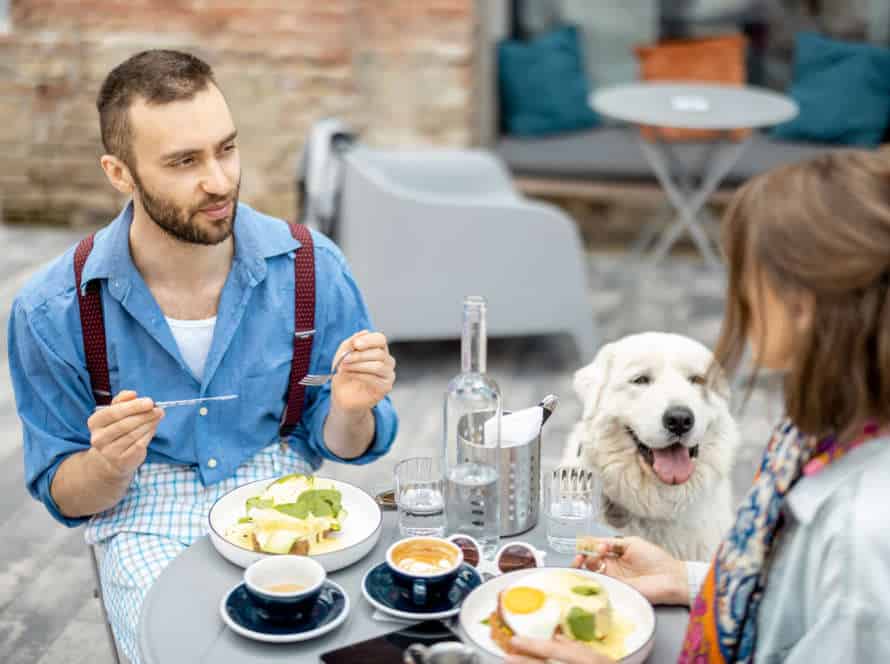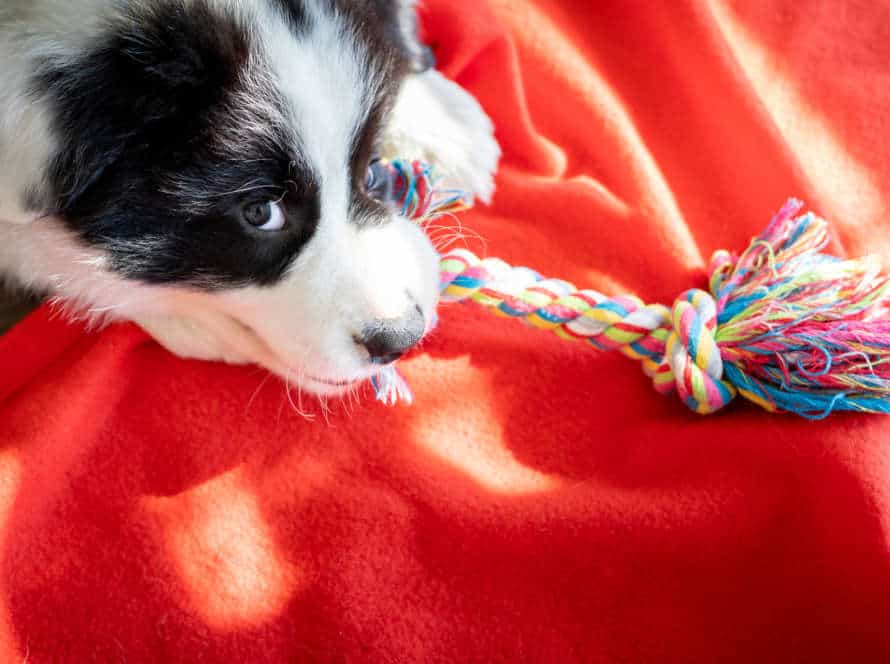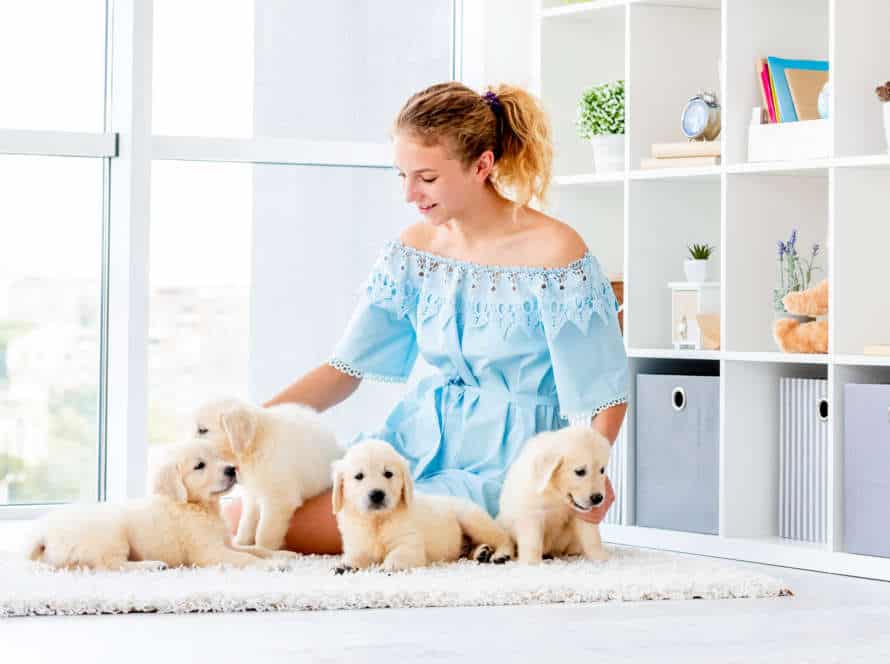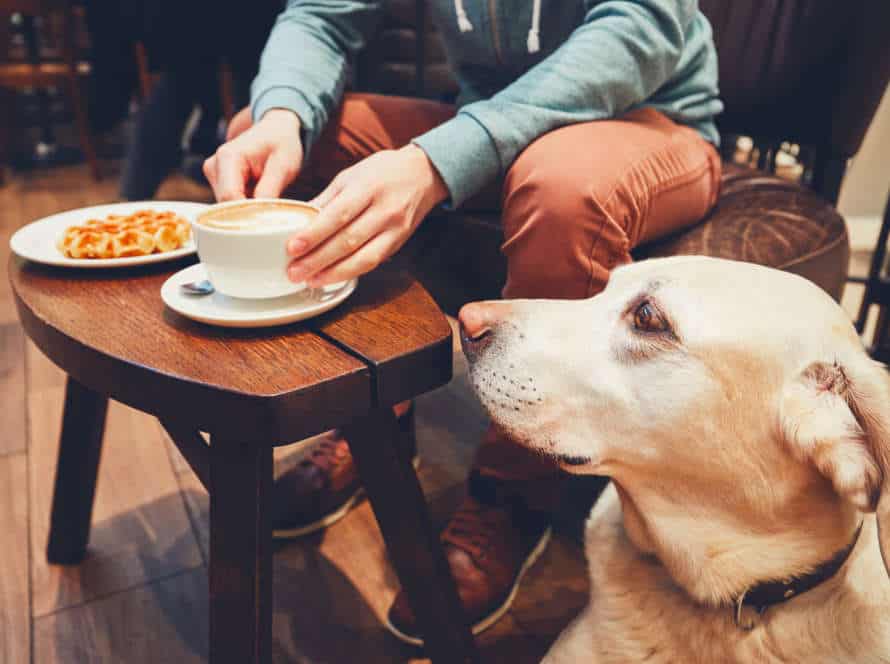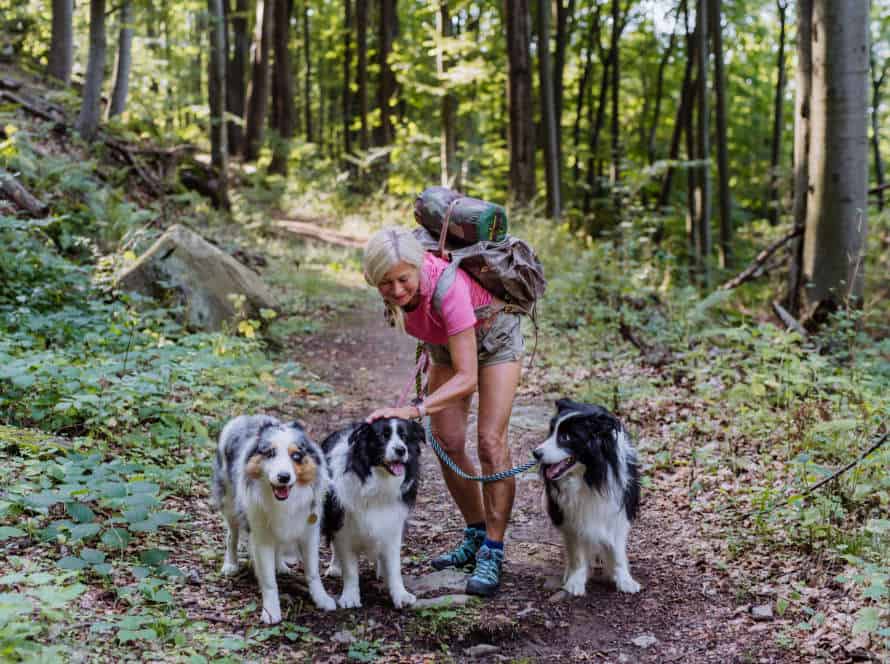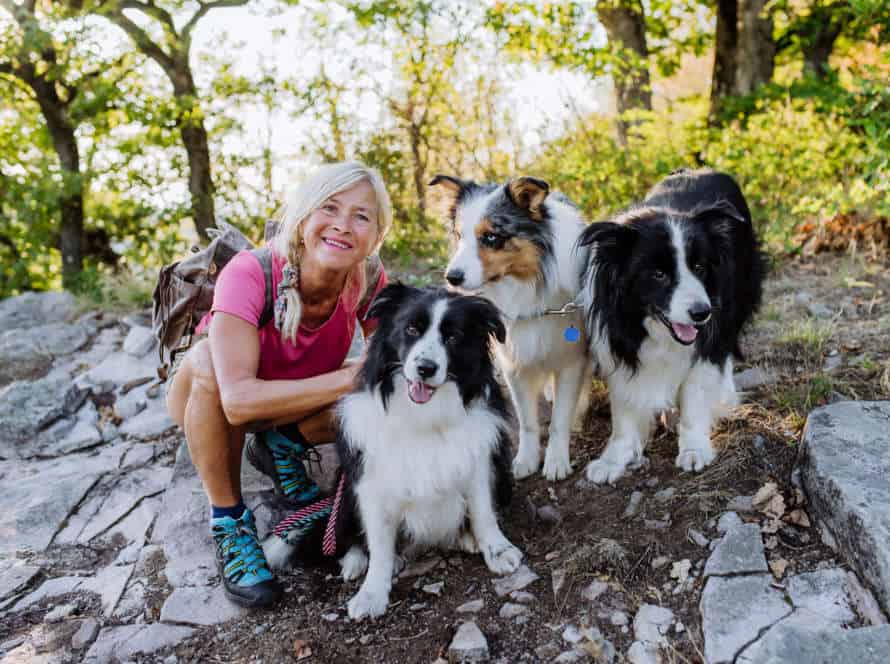Happy Puppies: The Socialization and Mental Health Connection
Socializing puppies is essential for their mental wellbeing and joy. It helps them gain social skills, builds self-assurance, and reduces anxiety. Let’s take a look at how to make sure your pup gets the socialization she needs:
- Get an early start: Socialize your pup between 3 and 14 weeks old when she is open to fresh encounters.
- Introduce her to various people, animals, and settings: Take her to parks, on walks, and pup-friendly activities.
- Reward her: Praise and give treats when she interacts positively with new experiences.
- Go slow: Gradually expose your puppy to different experiences and environments to avoid overloading her.
With the right socialization, your puppy can grow up to be a content, bold, and well-adjusted dog.
The Importance of Puppy Socialization
Puppy socialization is a must! It’s the process of showing puppies to different people, places, things, and animals in a good and regulated way. This helps puppies learn the skills they need for interacting with others, feeling secure in new places, and having greater self-confidence. It’s essential for their physical and mental health and can improve how they act when they’re grown up.
What is Puppy Socialization
Puppy socialization is essential! It’s the process of exposing your pup to new people, animals and experiences in a positive and secure way. Here’s why it’s important:
- Decreasing the chances of behavioral problems and aggression when they’re an adult.
- Learning how to interact with different people and animals.
- Strengthening the pup’s bond with their owner.
Socializing puppies leads to better mental health for them. Pro tip: Make sure to introduce new experiences, locations and animals to your pup bit by bit – don’t overwhelm them!
Why is socialization important for puppies
Socialization is essential for puppies. It helps them learn how to be around other dogs and people, as well as gives them confidence and coping skills. Doing so early on avoids behavioural issues and anxiety, which can be difficult and costly to fix later.
Benefits of puppy socialization include:
- Giving puppies more confidence and security in various situations, reducing fear and aggression.
- Teaching puppies how to communicate with other dogs, avoiding fights and other bad behaviours.
- Helping puppies make positive connections with people and new places, minimising future stress and anxiety.
Ultimately, socializing puppies builds a strong foundation for their development into healthy, happy adult dogs.
How to Socialize a Puppy
It’s vital to socialize puppies for them to become well-balanced and confident adult dogs. Early socialization is a huge part of their mental health and overall well-being.
Here are some tips for successful puppy socialization:
- Start as early as 3-14 weeks.
- Introduce your pup to a variety of people, dogs, and places.
- Reward positive behavior with treats or compliments.
- Keep socialization short and fun.
- Sign up for a socialization or puppy class.
Remember that socialization isn’t one-time, it’s ongoing. By socializing your puppy, you can ensure they will become a joyful and sound adult dog.
Mental Health Benefits of Puppy Socialization
Puppies are a worldwide hit, thanks to their happy-go-lucky vibes and unconditional love. But, did you know their cuteness has mental health benefits too? Studies show that proper socialization can help pups feel less fearful and anxious. It also boosts their self-belief and teaches them good behavior. So, let’s look into how socialization can improve a puppy’s mental health.
How socialization can improve a dog’s temperament
Socializing your pup can boost their mood and mental health.
First, introducing them to new people, animals and places while they’re young helps stop behavior issues like aggression and fear in the future.
Second, it helps them gain belief in themselves, reduce anxiety and learn how to interact with others appropriately. Plus, it gives them mental stimulation, warding off boredom and keeping them healthy.
Third, it strengthens the bond between you and your pup as you discover new experiences and learn together.
To sum it up, socializing your pup is essential for their mental health, and the time and effort you invest will be worth it in the end.
How socialization can help prevent behavior problems
Socialization is vital for puppies’ behavior and mental health. A socialized puppy is usually more confident, flexible, and has better problem-solving. Introducing them to people, animals, and different places can reduce their fear, anxiety, and aggression.
Mental health benefits include:
- Preventing phobias: During the important growing period, exposing your puppy to different things makes them less afraid of new things.
- Enhancing thinking: Playing and socializing helps stimulate their brain and improves their memory, attention, and learning.
- Encouraging healthy relationships: Socialization helps create good relationships between your puppy and others.
- Building emotional strength: Socializing can increase their emotional understanding and help them handle stress, build coping skills, and become stronger.
Make sure to socialize your puppy so that they’re happy and healthy!
How socialization can reduce stress and anxiety in dogs
Socializing pups is great for their mental health! It leads to improved confidence, trust in others, communication skills, temperament, and can even lower aggression & fear. Positive socialization experiences help avoid phobias, anxiety, and aggression in adult dogs.
For these amazing benefits, give your pup frequent chances to meet other dogs, people, and animals in a safe and controlled environment. Make sure the experience is positive and never push them beyond their comfort zone.
Puppy Socialization Techniques
Pups need socialization! It’s vital for their growth. It helps them get used to the world around them. Research shows that puppies that have had proper socialization have better managing skills when in stressful situations. They also feel more secure. In this article, we’ll explore puppy socialization techniques and why it’s important for mental health.
Positive Reinforcement Training
Positive reinforcement training is an approach that rewards pups for their good behaviour, rather than punishing them for bad behaviour. To socialize your puppy, here are some tips to follow:
- Get started early – Socialization of puppies is best within the 3-14 week window.
- Rewards – Give treats, toys, and love when your pup is friendly or calm around other people and animals.
- Stay consistent – Develop a routine and stick to it. Consistency is key to reinforce good habits.
- Remain patient – Training takes time, so don’t punish your pup for mistakes.
- Get professional help – Talk to a trainer or vet for additional support and tailored advice.
Positive reinforcement training can help puppies build social confidence and benefit their overall mental health. After all, puppies want to learn – it’s our job to teach them.
Gradual Socialization
Gradual socialization is a technique to safely and slowly introduce puppies to new experiences and help them gain confidence.
Do it one at a time; like, meeting someone new, taking a car ride, or going to a new place.
Keep an eye on their body language and behavior. If they seem scared, slow down or try again later.
Increase the intensity and complexity as they become more comfortable.
Reward them with treats and praises for good behavior and progress.
By doing this, puppies will develop social confidence and emotional resilience, which will make them healthier and happier as adults.
Exposure to New Environments
Expose your pup to new places.
This can help their mental health.
Start with familiar, but new, places.
- Your backyard or a nearby park.
Gradually move to more challenging places.
- Like busy streets or crowded markets.
Reward them with treats and praise.
Help them link new environments with positive experiences.
Increase difficulty of the new places slowly.
Let them interact with other dogs.
This builds confidence in new environments.
Socialization for Different Puppy Stages
Socialization: the learning process for pups! It’s essential they learn how to interact with people and pooches. Different puppyhood phases need different socialization types. All of this is important for your pup’s health and wellbeing as they grow. What are the stages of puppyhood and their socialization? Let’s find out!
Early Socialization for Puppies
Early socialization is essential for puppy development. It helps them form a positive basis for their future behavior and mental well-being. Socialization should begin at 3 weeks old, and continue through different puppy stages. Here are some effective techniques for each one:
- Neonatal stage: Birth to 2 weeks; let puppies experience gentle human touch, soft sounds and low-level light.
- Transitional stage: 2 to 4 weeks; introduce them to new environments, sounds and smells, and include handling and gentle play.
- Socialization stage: 4 to 14 weeks; give them a variety of stimuli and social interactions, like puppy play and exposure to different people, animals, and settings.
- Juvenile stage: 3 to 6 months; keep up with socializing and training, to maintain positive behavior.
- Adolescent stage: 6 to 18 months; keep giving socialization and training to prevent behavioral problems.
Early socialization is essential for happy and healthy puppy lives!
Adolescent Socialization for Puppies
Socializing is key for puppy development. It’s important to start early. There are four stages of socialization.
- Stage 1: 3-4 weeks. Puppies learn how to interact with their siblings.
- Stage 2: 4-12 weeks. They explore the world & you can introduce them to sounds, environments & people.
- Stage 3: 12-16 weeks. Their brains are developed & you can train them.
- Stage 4: 4-16 months. Adolescence changes their behavior. Keep socializing & training.
For proper guidance, seek advice from a veterinarian or trainer.
Adult Socialization for Puppies
Socializing puppies properly is super important. It helps them grow into content, balanced adult dogs. Adult socialization teaching focuses on showing puppies how to act when around other adult dogs and humans.
For different ages of puppy development, here’s how it should be done:
- 8-10 weeks: Introduce puppies to new people, places, and things. Ask friends and family to visit and play with the pups.
- 10-16 weeks: Keep socializing with more people and animals. Show puppies different sights and sounds.
- 16-20 weeks: Encourage puppies to join in group play and interaction with other dogs. Take them to crowded areas, like streets and transport.
Socializing puppies in their early stages is vital for their mental health and well-being as they grow. It sets them up for a life full of positive social experiences.
Conclusion: The Benefits of Happy, Socialized Puppies
To summarize, happy, socialized puppies have lots of advantages. They have better emotional and mental health. They also form stronger relationships with humans and can cope with different situations and surroundings.
In contrast, lack of socialization can cause fear, anxiety, and aggression. It affects the pup’s life and the lives of their people.
To make sure your puppy is content and well socialized, introduce them to various sights, sounds, people and animals from an early age. Also, give them lots of exercise, playtime and human contact for their overall welfare.
Frequently Asked Questions
Q: Why is socialization important for puppies?
A: Socialization is important for puppies because it helps them become well-adjusted and confident dogs. Proper socialization during the early months of a puppy’s life can help prevent future behavior problems and anxiety.
Q: How can I socialize my puppy?
A: Socializing your puppy involves exposing them to a variety of experiences and people, including different environments, other dogs, and humans of all ages and backgrounds. It’s important to do this in a positive and controlled environment, with plenty of rewards and positive reinforcement.
Q: What are some signs of poor mental health in puppies?
A: Signs of poor mental health in puppies can include excessive barking, destructive behavior, anxiety, fearfulness, and aggression towards people or other dogs. If you notice any of these behaviors in your puppy, it’s important to seek professional help to address the issue.
Q: Can socialization help prevent aggression in dogs?
A: Yes, socialization can help prevent aggression in dogs. Exposing puppies to different people, animals, and environments can help them feel more comfortable and confident, which can reduce the likelihood of future aggressive behavior. However, it’s important to note that not all aggression can be prevented through socialization alone.
Q: When should I start socializing my puppy?
A: You should start socializing your puppy as early as possible, ideally between the ages of 3 and 14 weeks. During this critical period, puppies are most receptive to new experiences and have not yet developed fear or aggression towards unfamiliar people, animals, and environments.
Q: How often should I socialize my puppy?
A: You should socialize your puppy frequently, ideally several times a week. It’s important to expose them to a variety of experiences and people to ensure they become well-adjusted and confident dogs.


